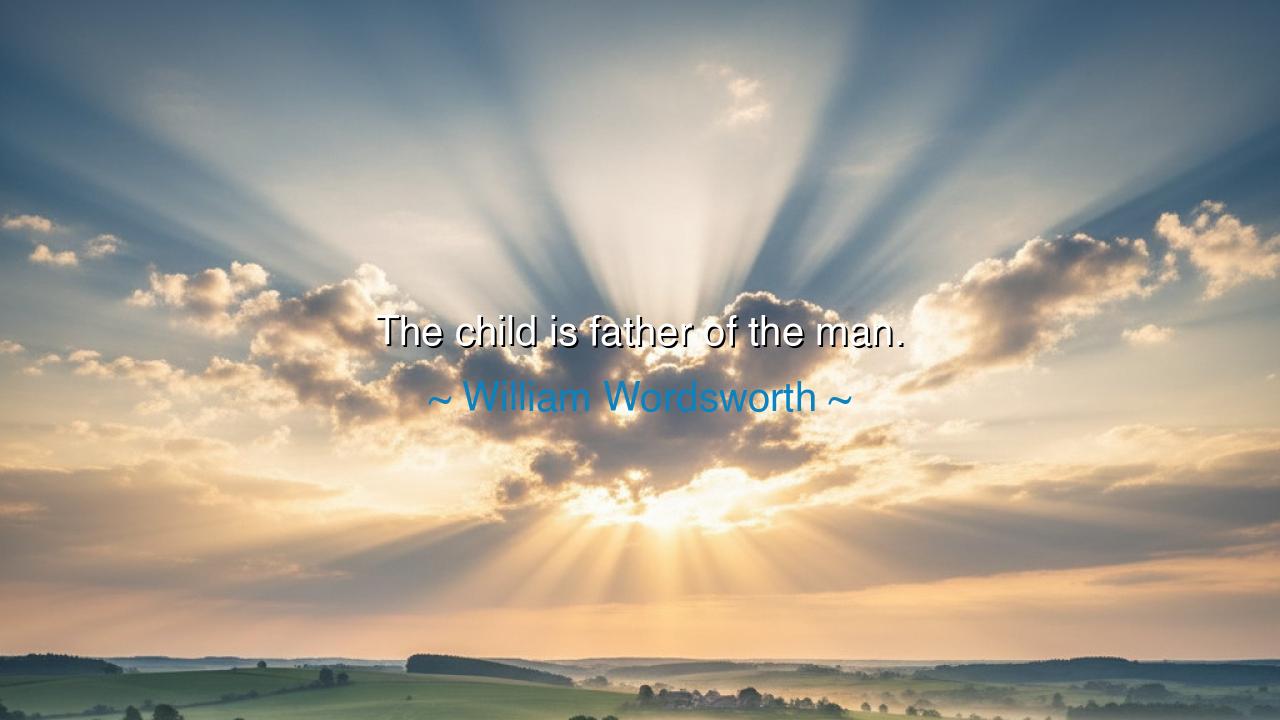
The child is father of the man.






“The child is father of the man.” Thus spoke William Wordsworth, the poet of nature and the soul, whose words echo like the murmur of a river — soft, yet eternal. In this brief but profound saying, Wordsworth unveils a truth that lies at the root of human growth: that the child we once were shapes the man we become. The innocence, wonder, and imagination of childhood are not lost fragments of the past; they are the foundations upon which the temple of adulthood is built. What we carry from those early years — our awe before the world, our first loves, our first fears — continues to live within us, whispering guidance long after we have forgotten the sound of our own laughter.
This quote finds its origin in Wordsworth’s poem “My Heart Leaps Up,” a meditation on the joy he felt upon seeing a rainbow. “My heart leaps up when I behold / A rainbow in the sky,” he wrote, declaring that the same feeling that stirred him as a child still stirred him as a man. From this continuity of feeling came his realization: “The child is father of the man.” For the heart that delights in beauty in youth is the same heart that gives depth to wisdom in age. The poet thus teaches that true maturity does not mean abandoning the child within, but preserving it, nurturing it, and letting it breathe through every act of the grown soul.
To say that the child is the father of the man is also to acknowledge that our beginnings govern our becoming. The lessons we learn, the emotions we feel, the imagination we cultivate — all these are seeds planted in youth that blossom in maturity. If a child grows in love, he becomes a man of compassion. If he grows in fear, he becomes a man of doubt. Therefore, every word spoken to a child, every kindness or cruelty shown, ripples through time, shaping the destiny of a life. The ancients knew this truth well. In the education of the young, they saw the preservation of the state itself. “As the twig is bent,” they said, “so grows the tree.”
Consider the story of Helen Keller, who, though struck blind and deaf as a small child, was shaped by her teacher Anne Sullivan’s patience and devotion. Within that silent child lay the strength, wisdom, and eloquence of the woman she would become. Sullivan did not merely teach her words — she taught her to see with the heart. And in time, that child of silence became a voice for millions, proving Wordsworth’s truth: the spirit formed in childhood becomes the guiding power of adulthood. Helen’s courage, curiosity, and determination — the qualities sown in her early years — gave birth to the woman the world would one day honor.
Yet Wordsworth’s insight reaches even deeper, into the spiritual heart of man. The child is not only the physical beginning of life, but the moral and emotional compass of the soul. The child believes, trusts, dreams, and forgives — qualities that adults too often lose in their pursuit of logic and ambition. But when a man remembers the faith of his youth — when he keeps alive the innocence and wonder that first opened his eyes to the beauty of the world — he becomes wise not in pride, but in love. Thus, the child fathers the man by reminding him of what is pure, what is simple, what is divine.
In this way, the saying is not merely about growth but about returning. The greatest men and women of history have always been those who carried the heart of a child within them. Leonardo da Vinci looked at the world with the curiosity of a boy, and from that wonder came inventions that still astonish the mind. Albert Einstein once said, “Imagination is more important than knowledge,” for he, too, understood that it is the spirit of the child — questioning, playful, daring — that gives birth to genius. The wisdom of age must drink from the wellspring of youth, or it will run dry.
Therefore, my children, guard the child within you. Do not let the burdens of the world silence its laughter or blind its eyes to wonder. Remember the first time you marveled at the stars, the first time you believed in goodness, the first time you felt awe before life itself — for these are not memories to be buried but fires to be rekindled. Teach your own children not only facts and laws but the sacred art of wonder, for from wonder springs joy, and from joy springs truth.
The lesson of Wordsworth’s wisdom is this: the soul does not grow by discarding its beginnings, but by deepening them. The man who honors his inner child walks closer to truth than the man who forgets it. So cherish the part of you that still sees the world as new, that still believes in beauty and kindness. For that child, born in the dawn of your life, is the eternal father of who you are — and who you are still becoming.






AAdministratorAdministrator
Welcome, honored guests. Please leave a comment, we will respond soon